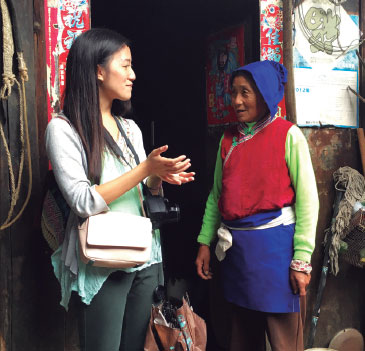Travel is more than the seeing, says barrier-free tour organizer
Updated: 2016-08-15 06:55
(HK Edition)
|
|||||||
Visually impaired people can also enjoy travel just like sighted people, provided their trips are designed with the focuses on smelling, tasting, touching and hearing, said Cindy Chiu Sin-ting, 27-year-old co-founder of local travel group Ha Look HK, which promotes barrier-free tours.
Bearing that belief in mind, Chiu and her two teammates applied for Hong Kong Federation of Youth Groups' Back Packers program with a plan that emphasized the above four senses. Her destination is Kunming, Yunnan province.
Kunming links Vietnam by rail and Myanmar and Laos by road. Authorities in Kunming have affirmed the city's key role in the Belt and Road (B&R) Initiative, as a vital hub to connect China with South Asia and Southeast Asia.
"Besides its strategic position, we chose Kunming because of its resemblance to the New Territories in Hong Kong," Chiu said, explaining that both Kunming and the New Territories have urban and rural areas.
"If we manage to launch the travel (concept) in Kunming, we are confident that we can have a similar one in Hong Kong," Chiu said.
|
Cindy Chiu Sin-ting (left) talks with a nanny of the Yi ethnic minority in Damoyu village in Kunming, Yunnan province. |
With HK$6,000 funding and assistance from four Kunming-based NGOs, the group embarked on the road on July 1. During the five-day trip, the group tasted tea, which has a history in Yunnan dating back to Han Dynasty (206 BC-AD 220), took a carriage in an old county and delighted to birdsong in a park.
They also went to a wet market to smell a variety of fresh wild mushrooms. There are around 250 kinds of wild mushrooms in Yunnan, accounting for over half of the world's edible mushroom species and two-thirds of the species found in China.
"A city's charm lies not only in the well-known places of interest, but in every mundane sensation," Chiu said. "Five days are not enough to fully experience Kunming as there is a lot to smell, to taste, to hear and to touch."
The group also promoted their barrier-free travel concept to their partner NGOs and discussed with them how to add social impact to a commercial travel model. Chiu said that she got a lot of inspiration from Abu Social Enterprise, which promotes new travel patterns for old villages.
"It occurred to me that besides sightseeing, we can do a lot more in villages. For example, Abu has organized activities like painting and running in some underdeveloped but well-conserved villages in Kunming," Chiu said.
The group's next plan is to draw from what they experienced and learnt in Kunming, and develop a similar travel product that helps the city's visually impaired explore Hong Kong with sighted persons. The group is designing routes to Peng Chau, a small island off the northeastern coast of Lantau Island. The island is known for a Tin Hau temple built in 1792.
Chiu thanked Back Packers for allowing her group to translate their thoughts into reality and enabling them to achieve their goal in bringing the pleasure of travel to visually impaired people. She also noted that the program has deepened her understanding of the B&R Initiative.
"We spent three days studying the initiative and found out it covers lots of cities and regions, familiar or strange. Given that many diversified cultures thrive along the Belt and Road, cultural exchanges can bring the policy down to earth, helping it become better known to Hong Kong's youth," Chiu said.
She also suggested young people take advantage of similar B&R-associated programs to get a better and more complete understanding of the mainland. "A region being underdeveloped doesn't mean we should view it negatively. I will encourage my friends in Hong Kong to visit the mainland with an open mind, as the culture is rich and diverse and people are friendly," Chiu added.
(HK Edition 08/15/2016 page7)
